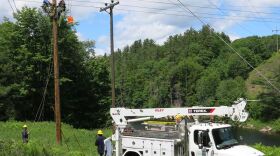Many people in New Hampshire are used to slow internet, but with COVID-19, what was a challenge has become a crisis with more people needing to access their doctor's offices, classrooms and workplaces online.
With new funds available from the state for broadband projects, there’s some hope that the Internet situation might finally improve for rural Granite Staters.
On a Friday night in May, Jeanne Ryer was trying to send an email. But she couldn’t get anything sent -- her daughter was uploading a grad school assignment -- a PowerPoint presentation with video narration.
It was slow-going.
“You bet we were watching that little bar like crazy,” she said.
After watching that bar for five hours: the assignment finally sent, and so did Ryer’s email. She says both she and her daughter were relieved.
“We didn’t know if she was going to have to drive over to the next town over to the library or to Plymouth to upload it,” Ryer said.
Ryer lives in Sandwich. She’s gotten used to this - going to the library one town over, sitting at a McDonald’s, or sometimes making the hour-long round trip to Plymouth State University to use the college’s wifi, just to get faster internet.
Ryer pays about $60 a month for internet speed that’s 7 megabits per second download, 1 megabit per second upload, which is why her daughter’s assignment took so long to send.
That is well below the federal definition of broadband, which is 25 megabits per second download and 3 megabits per second upload.
According to the town, only 13 percent of residents get that kind of speed.
Ryer says she and her neighbors in Sandwich are tired of not having what so many other people in the state take for granted.
“It’s like if you’re driving on 93 and all of a sudden the bridge isn’t there. We wouldn’t tolerate that any other way, but we’re putting up with it with this digital infrastructure,” she said.
People ask Ryer: if the internet in Sandwich is so bad, why not move?
“I belong here. I live here,” Ryer said. “I’ve lived here for almost 40 years. I’ve raised my kids here.”
But some have moved away. Realtors in the area say that many potential buyers also don’t move to the area, because they’re not confident they’ll have the internet speed they need to work from home.
"If we're going to have any hope of moving forward seriously with real telemedicine in this country, with real distance learning, we've got to address this issue."
About a year ago, the town’s select board formed a Sandwich’s Broadband Advisory Committee to see if they could come up with a solution to their internet problems.
There was one constraint: the town didn’t want to raise taxes, but voters did approve for some funds to be used for research.
“I think people are really motivated and really want us to get this problem solved,” said committee member Cathy Crooker. “So yeah, I’d say there’s some solidarity around this”
For her, getting fast, reliable internet is about much more than just accessing Netflix.
“If we’re going to have any hope of moving forward seriously with real telemedicine in this country, with real distance learning, we’ve got to address this issue,” she said.
The problem for rural areas is that it’s expensive for internet service providers to build out connections in rural areas. It’s a low return on investment to get that “last mile” built.
“I think that’s why a lot of rural America has been left behind,” Crooker said. “It’s hard for a company to make much money, so they want to focus their efforts on more densely populated areas.
Sandwich’s broadband committee has made progress. In February, they had three companies that were interested in completing a project that would bring high-speed internet to town.
Then COVID-19 came along, and almost everyone found themselves relying on their home internet more than ever.
What people in rural areas knew about their limited internet access became clearer to the state.
In early June, Gov. Chris Sununu announced that some of the federal CARES Act money for coronavirus relief would be put toward expanding broadband to underserved areas in New Hampshire.
For Julie Dolan, the chair of Sandwich’s Broadband Committee, this was welcome news. Getting this money would be a game changer for the town’s 1,300 residents.
“This town is the perfect fit. This is exactly what this money is meant for. A town like this that’s very rural, that’s very sparsely populated,” she said.
Sandwich submitted a proposal for $2.5 million to build out a fiber internet network to all residents that currently don’t have internet speeds that meet the federal definition of broadband.
But she says the state’s application requirements are stringent, and in her view, actually make it harder for towns like Sandwich in this process.
In a letter to the governor, congressional delegation and other state officials, Dolan said requirements such as needing to have signed agreements for access to utility poles, a heavily weighted score for lowest cost to the state per household served, and upfront costs by applicants disadvantaged potential applicants in rural communities.
“I think what it’s aiming for are good public-private partnerships between towns and companies,” she said. “But basically the only ones who stand to gain from this are large private companies that have poles, that have wires that have construction companies that have the crew to be able to do this.”
Dolan says the work the town already did helped them have an application ready to submit under the tight deadline.
She’ll find out later this month if the proposal has been accepted. She says despite the stringency of the requirements, she’s cautiously optimistic about Sandwich’s chances.








